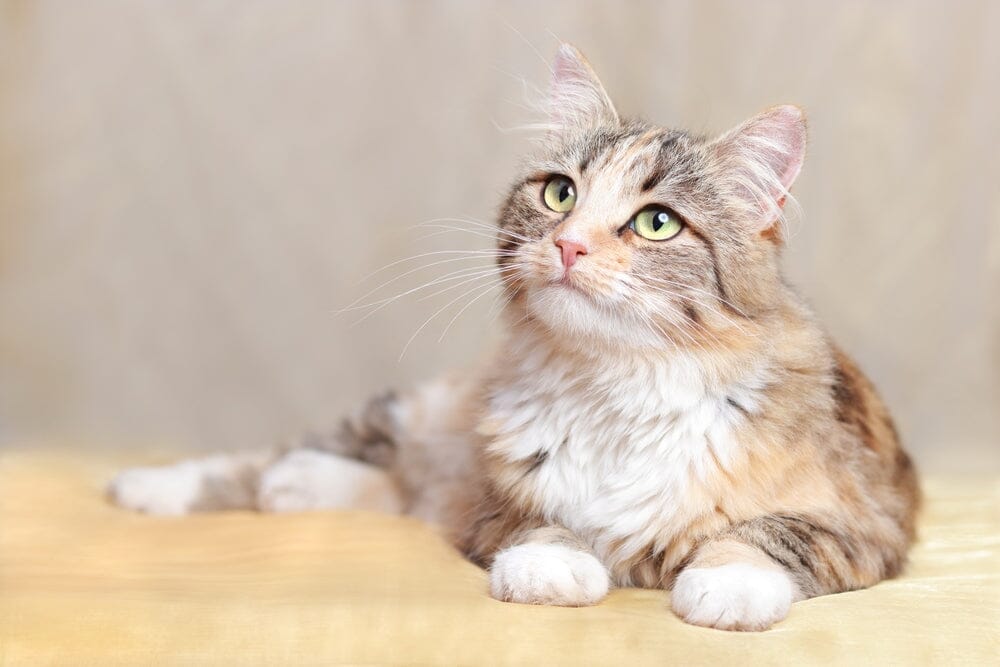June 28, 2021 |6 min read
Why Do Cats Purr?

Written by

Cat Litter That Prioritizes Their
Health & Your Happiness.
to get your first bag for only $14.99
Picture this: you’re sitting at your computer reading a PrettyLitter blog about why your cat likes to lick herself when all of a sudden you hear something. A soft, low-pitched but unmistakable purring sound coming from your cat, [insert your cat’s name here]. She rubs her body up against your leg as she continues to radiate her deep, velvety purr. She’s happy, or so you think. Maybe she’s hungry… hmm, what does she want?
Admit it: as a cat owner and cat lover, you’ve probably wondered why your house cat purrs, or better yet, assumed it’s because she’s happy or hungry. While that may be true in some instances, cats have many reasons to purr. While we don’t know all the reasons, we do know some, so here we go.
First of all, most cats can purr. Even jungle cats like cheetahs and cougars! They use their larynx and diaphragm to produce this low-frequency communication. But according to taxonomists, there are pantherine exceptions to the purring rule, such as lions, tigers, leopards, and jaguars. They roar instead.
Since you don’t own a tiger or lion as a pet, let’s start with the most obvious speculation why your domestic cat purrs: she’s content. At a young age, kittens purr when bonding with their mothers. This bonding time is nursing time. The mother cat purrs to reassure her kittens she’s going to feed them. Her kittens also purr because not only are they safe and comforted, but they’re about to eat. And let’s be real, who isn’t happy when they’re about to eat?
However, cats purr differently when they’re hungry and want you to feed them cat food like PrettyPlease. There is a distinct great sense of urgency behind these purrs. Cats mix their usual guttural, feline purr with what can only be described as unpleasant mew or cry, similar to when a human baby cries. It’s so distinct that even non-cat owners have noticed the difference as they attribute it to the feline friend being hungry.

So, cats purr and cats knead when they’re content. Cats purr when they’re hungry. Cats who purr to self-soothe themselves in stressful situations. They purr when they’re friendly with each other. They purr when they love on you. They’ll purr when they’re grooming themselves. They purr when they’re relaxing. They purr in just about any positive social situation. But they also purr when they’re frightened or injured, and the most surprising reason why they purr?
Bone and tissue regeneration.
Yes! Bone and tissue regeneration!

Domestic cats purr at a frequency range of 25-100 Hz. This range promotes regeneration by healing bones, restoring wounds, repairing tendons, and building muscle. Bones react to purring at around 25-50 Hz, while soft tissue reacts to it around 100 Hz. Cats have been observed lying alongside each other and purring when one is hurt. We call this purr therapy. It eases their breathing and lessens pain and swelling. Cats’ purr has been an effective therapy tool for cats that humans have patented purr-like devices for potential therapy usage.
Since cats spend a lot of time lying around, waiting to hunt their next prey, researchers believe that purring stimulates their bones to prevent them from becoming brittle and weak. In fact, because of this, researchers have recommended securing vibrating plates to astronauts’ feet so they’ll retain bone density during long space voyages. Wow! Cats really are out of this world!
Purring benefits both cats and humans. Think about it. When your cat, [insert your cat’s name here], is curled up in your lap and purring as you pet her soft, plush fur, how do you feel? Relaxed? Warm? Loved? All of the above? Yeah, all of the above. Humans are psychologically affected by a cat’s purr because it’s a calming stimulus that helps us feel relaxed. Maybe some of us even select our cats in hopes they’ll be more likely to purr in our company. Being comforted by your cat… what a thought. A beautiful thought really.
Tony Buffington, a cat expert, and veterinarian at Ohio State University, once said, “All behavior depends on history, context, and expectation. So it's naive to think that cats can only purr for one reason—it's like thinking that people can only laugh for one reason.”
That’s why it’s a good idea to take a page out of the kitten-mother bonding book by bonding with your cat and getting familiar with her body language and how she purrs. So next time your house cat, [insert your cat’s name here], is purring and rubbing herself on your leg as you read the latest At PrettyLitter blog, you can better understand whether she’s hungry, frightened, self-soothing herself, or just happy she’s in your company. More often than not, it’s most likely the latter.
Sources:
1. https://www.bbc.com/future/article/20180724-the-complicated-truth-about-a-cats-purr
2. https://www.advantagepetcare.com.au/au/new-owners/four-reasons-why-cats-purr/







